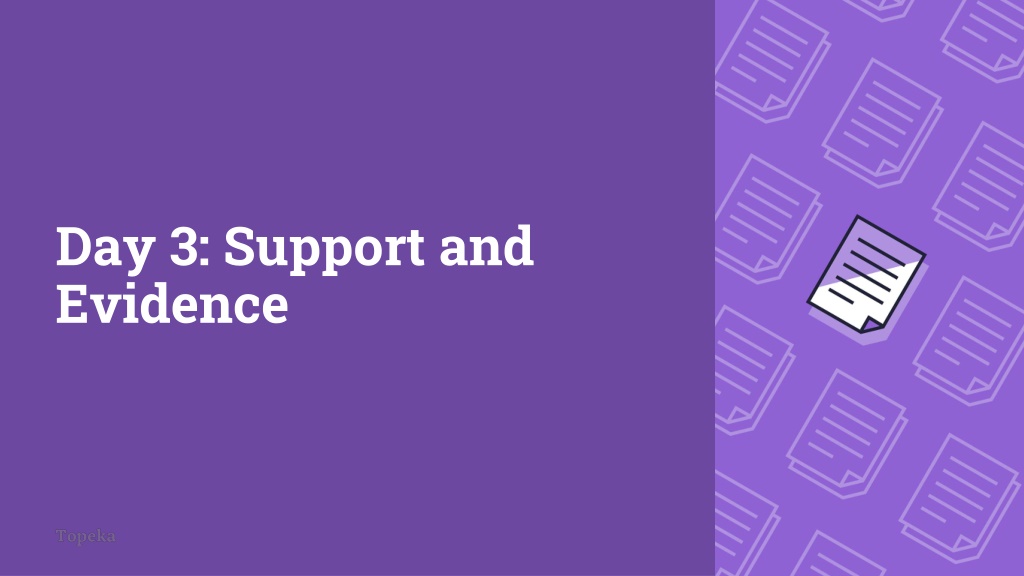
Building Strong Arguments: Reasons, Evidence, and Support
In this informative content, you will learn about the importance of reasons and reasoning in constructing solid arguments. It explains how reasons connect to claims, the difference between reasons and reasoning, and how evidence supports a claim. The content emphasizes using well-organized reasons and good evidence to build successful arguments, and discusses what makes evidence relevant and good. Through examples related to students using cell phones at school, the importance of relevant and appropriate evidence is highlighted.
Download Presentation

Please find below an Image/Link to download the presentation.
The content on the website is provided AS IS for your information and personal use only. It may not be sold, licensed, or shared on other websites without obtaining consent from the author. If you encounter any issues during the download, it is possible that the publisher has removed the file from their server.
You are allowed to download the files provided on this website for personal or commercial use, subject to the condition that they are used lawfully. All files are the property of their respective owners.
The content on the website is provided AS IS for your information and personal use only. It may not be sold, licensed, or shared on other websites without obtaining consent from the author.
E N D
Presentation Transcript
Day 3: Support and Evidence 1
Entry Ticket Identify the reasons connected to each claim. 2
Reasons and reasoning help build arguments. Reasons Reasoning Links your evidence to your reasons and back to your claim Reasons explain why you believe your claim Reasons provide an organizational structure Explains how you interpret evidence Demonstrates your knowledge of the topic or text 3
What is the difference between reasons and reasoning? Reasons Reasoning What you think Why you think this reason is proven by evidence. The main points of your argument Explains your thinking about evidence and its link to your reasons and claim 4
Successful arguments use well- organized reasons and provide evidence to prove those reasons and support the claim. How do you support a claim with evidence? Evidence comes from reliable sources. Examples from real life can also be used as evidence. 5
What makes good evidence? Good evidence is Relevant Appropriate Valid Related to the topic From a trustworthy source Accurate Closely connected to the reason Closely connected to the focus of claim True From reliable and authoritative sources Not outdated Closely connected to the reason it supports 6
Claim Students should be allowed to use cell phones at school. Reason Good evidence is relevant. Cell phones improve student safety. Relevant Evidence For example, if a student is in a dangerous situation, they can call for help. Not Relevant Evidence According to the National Emergency Number Association, over 240 million calls are made to 911 in the U.S. each year. 7
Claim Students should be allowed to use cell phones at school. Reason Good evidence is appropriate. Mobile apps can support learning. Appropriate Evidence Khan Academy, a popular learning application, has a mobile version. Not Appropriate Evidence All my classmates say that they frequently use their phones for homework. 8
Claim Students should be allowed to use cell phones at school. Reason Good evidence is valid. Cell phones can help students access information everywhere. Valid Evidence Students can access definitions, formulas, and all sorts of web sites. Not Valid Evidence Every book on earth is on the internet. 9
Reasoning is an explanation of how your evidence proves your claim. What is Reasoning? It provides the connection between your claim and your reasons and evidence. Evidence Reasoning Claim 10
Reason: Cell phones enhance safety. Reason: Mobile apps can support student learning. For example Evidence: For example, if a student is in a dangerous situation, he or she can call for help. Evidence: Students can access definitions, formulas, and all sorts of web sites and apps. Claim: Students should be allowed to use cell phones at school. Reasoning: In schools where students aren t allowed to have cell phones, they aren t able to call for assistance. Reasoning: Students can use these tools to find and learn information quickly and avoid having to waste their time memorizing things they can easily look up. 11
Developing Support Activity Provide evidence and reasoning to support a given claim and evidence. On your own, develop the counterargument. 2
Four Corners Debate In a group, make your best argument and then share with the class. 2






















